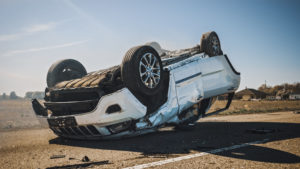What to do After a Vehicle Rollover in Florida?
Like head-on collisions, rollovers can be one of the most deadly types of accidents because of the physics involved. This type of accident is often the result of a sharp turn or another vehicle colliding with your car. During a rollover, your vehicle will tip over onto its side or the roof. In severe rollover cases, the vehicle may roll or flip several times.

Rollovers are relatively uncommon for most vehicles, but they are prevalent with SUVs and other tall, narrow vehicles. This is because SUVs, vans, and trucks have a higher center of gravity, making them more top-heavy than smaller passenger cars.
What are the Common Causes of Rollovers?
According to the NHTSA, 40% of all fatal rollover accidents involved speeding, and nearly 75% occurred in areas where the legal speed limit was 55 MPH or above. What is interesting about rollover crashes is that the vast majority of them occur on rural roads and are single-vehicle accidents. 90% of rollover crashes happened when the driver was going straight or rounding a curve, suggesting that distracted driving plays a higher role in this type of crash than other types of crashes. Other causes can include:
- Distracted driving
- Ignoring traffic signs or signals
- Fatigued driving
- Driving under the influence of alcohol or drugs
- Reckless behavior during bad weather or low visibility
There are two ways a vehicle can rollover: Tripped or Untripped. A tripped rollover is the most common, contributing to 95% of all rollovers. It happens when the car hits soft soil, a guardrail, or a steep slope. Untripped is much less common and usually occurs when a vehicle is top-heavy and traveling at a high rate of speed.
The Most Dangerous Roads in Tampa
EverQuote compiled data from the NHTSA and found that Highway 4 in Tampa is the most dangerous in the United States. The community organization Plan Hillsborough’s Vision Zero program details Tampa’s most dangerous streets. The list includes:
- Mango Road/CR579 (MLK Boulevard to US 92)
- 78th Street (Causeway Boulevard to Palm River Road)
- Gibsonton Drive (I-75 to Balm Riverview Road)
- 15th Street (Fowler Avenue to Fletcher Avenue)
- Bruce B Downs Boulevard (BBD) (Fowler Avenue to Bearss Avenue)
- Sheldon Road (Hillsborough Avenue to Waters Avenue)
- Lynn Turner Road (Gunn Highway to Ehrlich Road)
- Fletcher Avenue (Armenia Avenue to Nebraska Avenue)
What are the Most Common Injuries from Rollovers?
Many factors contribute to the type and severity of injuries that occur in vehicle rollover accidents. The factors include whether there was an initial impact that led to the rollover (non-arrested roll), the rollover itself, and whether there was another impact after the rollover (arrested roll). Common injuries can include:
- Traumatic Brain Injury due to impact with the steering wheel, airbags, or roof collapse.
- Severe trauma of upper extremities as the cabin collapses.
- Internal injuries such as collapsed/punctured lungs or other perforated organs.
- Becoming trapped in the seat belt or ejected if not wearing a seat belt.
- Broken neck, torn muscles, herniated spinal discs, and more from the cabin collapsing.
What do I do After a Vehicle Rollover?
When you’ve been involved in a rollover accident, you should always seek immediate medical attention, even if you feel like the injuries are minor. The shock and trauma can desensitize you to potentially significant injuries. It may take hours, days, or even weeks for the symptoms of injuries to present themselves. Delaying medical attention could not only harm your well-being, but it can also cause hardships later on in the insurance claims process.
Our Tampa car accident lawyers advise that you contact us as soon as possible. Darrigo and Diaz Law has an expert team of personal injury attorneys in Tampa that can help reconstruct the event and get you the compensation you need to cover medical expenses. We encourage you to immediately reach out to us online or call (813) 774-3341 immediately for a confidential, free, and absolutely no-obligation phone consultation.
